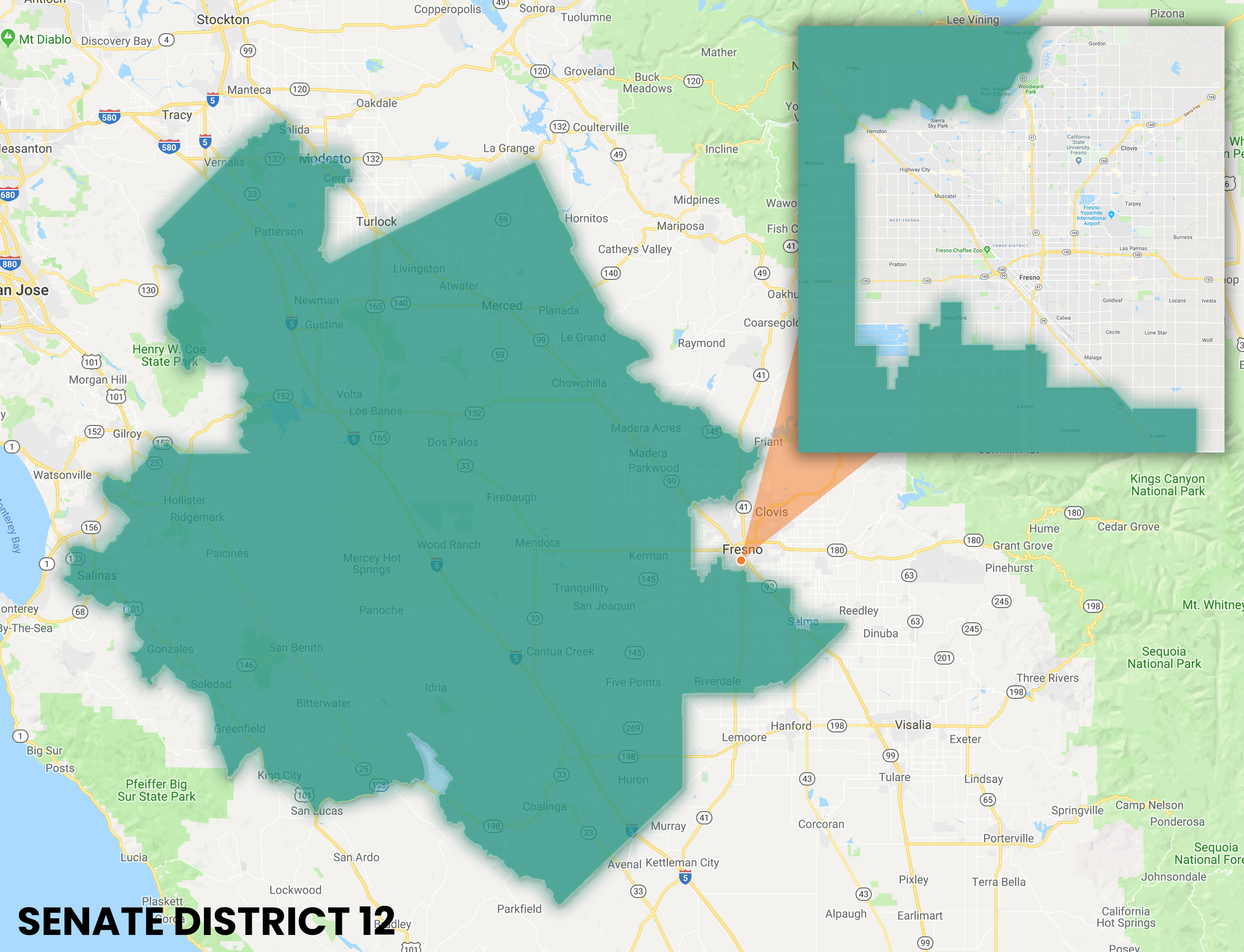Share
All eyes in Sacramento are focused on the sprawling state Senate race that involves voters in Fresno, Madera and Merced counties, as well those on the central Coast.
It pits two candidates ideologically apart on many issues: Democrat Anna Caballero, an assemblywoman from Salinas; and Republican Rob Poythress, a Madera County supervisor. Both are looking to succeed Anthony Cannella (R-Ceres), who is termed out.
Both candidates differ when it comes to immigration, public safety, and high-speed rail. However, they have similar thoughts on water, gun control, and aspects of California’s housing crisis.

The Campaign
The race is competitive. Each party scored nearly an even split in the June primary (Caballero won a plurality of 43%, and Poythress edged fellow Republican Johnny Tacherra, 26%-22%, to make the top two run-off).
The two state parties are pumping hundreds of thousands of dollars into the race. The Republicans hope to retain the seat and block the Democrats from achieving a two-thirds supermajority in the Senate. A supermajority allows the party to raise taxes, assuming they vote as a bloc.
The district covers all or parts of six California counties — Fresno, Stanislaus, Madera, Merced, San Benito, and Monterey. Both candidates are putting tremendous energy into getting their names and faces in front of voters who may be unfamiliar with them.
“People know who I am because I’ve been very active as either a council member, a member of the governor’s team or as an Assembly member,” Caballero said. “I’m traveling back to communities that I’ve been to before who know me.”
Poythress said running in a competitive primary has helped his name recognition.
“I had radio exposure as well as printed material and phone banks. We had walkers and so that really helped to increase my name recognition and in the other five counties besides Madera,” Poythress said.
Caballero’s Path

“It was a company town. I saw a lot of injustices and what happens when the only job in town is owned by a copper mining community. People felt they couldn’t stand for themselves,” Caballero said.
That led to law school in UCLA and practicing labor law for California Rural Legal Assistance. They assigned her to Salinas, and she fell in love with the community.
Caballero started her political career in Salinas, serving on the city council from 1991-98 before serving as mayor for another eight years.
She won two terms to represent Salinas in the state Assembly in 2006 and 2008, before losing a state Senate race to Cannella, in 2010. She returned to the Assembly, winning a 2016 election.
In the interim, Caballero worked in Gov. Jerry Brown’s administration as the secretary of the Business, Consumer Services and Housing Agency from 2011-15.
She shuns labels of where she falls on the Democratic scale: “On some issues, I’m more moderate. On others I’m socially more progressive.”
Poythress Background

For the last 13 years, his family also has operated Teco Hardware. Poythress worked in banking following his graduation from Cal Poly.
Madera city residents elected Poythress to the city council in 2004 and 2008, and mayor in 2012. He then ran and won a seat on the Madera County Board of Supervisors in 2016.
“I love policy making, serving the people and making a difference. … I said ‘yep I’m ready for it.’ And so I threw my hat in the ring,” Poythress said of running for state Senate.
“I believe if we have a strong economy, lower taxes, a low regulatory environment — that creates more jobs, which also helps to raise the boat for everybody all of the residents in our community,” Poythress said.
THE ISSUES
Immigration
Caballero voted in favor of SB 54, the California Values Act which some call the “Sanctuary State” bill.
She doesn’t want local police of sheriff resources to enforce federal immigration law. She wants to leave that for Immigration and Customs Enforcement.
“We want to make sure that people that are victims of crime and part of our community can continue to be of our community and feel safe here,” she said.
“It’s a very sad piece of legislation. It does nothing to protect the undocumented immigrant in California. … It actually opens up the opportunity for ICE to find folks in this situation and to deport them. If we didn’t have SB 54, ICE could go right to the jails and deal with the bad guys the criminals,” Poythress said.
Caballero has no quibble with the work ICE does, but she disagrees with detaining immigrants at courthouses, schools, and churches.
“It’s intimidating, and (immigrants) are less likely to make complaints to police officers and they become victims,” she said.
Poythress is on the other side.
“I believe ICE should have the ability to deal with the criminal element that are undocumented at the jails, at the courthouses, wherever they can do that, without harming those that are undocumented that are simply doing their jobs,” Poythress said.
High-Speed Rail
Poythress echoes a common conservative sentiment with his opposition to California’s high-speed rail project.
“From day one, the high-speed rail has been an unmitigated disaster,” Poythress said.
He notes the lack of private investment, low federal funding, and inflated cost estimations. He wants to cut the losses now.

Caballero supports the project.
“It will bring very important opportunities to be able to travel, get out of their vehicle, move across the state and put people to work,” Caballero said. “It has contributed to the growth of (local) businesses.”
Gas Tax
Caballero voted for SB 1, the 2017 bill that raised the gas tax and vehicle license fees to repair roads.
“I believe that is critically important to our infrastructure. We have big trucks that tear up our roads on a regular basis,” Caballero said. “Those roads need improvement in order for us to be able to move.
Caballero said the additional state money funnels to local governments to supplement road projects.
“We were looking for solutions and the funding we needed to do work all over the state,” she said. “The way to do it was to agree to do it through bonding and payments through the gas taxes and fees.”
“(The tax) puts a disproportionate amount of tax burden on lower-income people. (It) is a very regressive tax,” Poythress said.
He points out the disparity between drivers in the Bay Area and the Central Valley.
“It’s basically the wealthy that are not paying a dime in tax because they drive electric cars. (They) are putting the huge burden on folks in areas like this that have cars typically that have lower MPG,” he said.
Poythress said the Legislature needs to reallocate current tax revenue into roads. He also wants Caltrans to be more efficient.
Housing
Caballero said the state’s housing crunch needs local commitment and funding to be solved. She supported the concept of local redevelopment agencies, which were jettisoned during the Brown administration.
“(RDAs) are real important, because that provides the revenues to get rid of blight and start building affordable housing. I also support the bonds the state has passed,” she said.
Additionally, she supports reforming CEQA, the state’s stringent environmental laws that apply to public works projects.
“In many regions, (CEQA) is used to slow down, or stop development. What that does is drive up the cost, because time is money,” Caballero said.
Poythress agreed on CEQA reform and more local involvement. He also wants to tackle labor issues that he says drive up costs.
“On public housing projects, the prevailing wage just causes the costs of these things to skyrocket. Private industry could do it a lot cheaper without prevailing wage,” he said.

Universal Health Care
Health care is another issue separating the two candidates. Caballero favors universal care, and Poythress does not.
Caballero says negotiating with the federal government is the key to pay for the estimated $400 billion per year price tag in California. However, Caballero opposes raising taxes to create universal health care in the state.
“To be able to put it in a pool and be able to use it in a universal health care system,” she said of her funding solution. “We can’t do that right now with the position the federal government is taking. It is not fiscally prudent until we get cooperation.”
Poythress says health care is best provided through private insurance.
“The thing that I fear most about government — control health care — it’s called rationing. And that’s exactly what happens in the European countries. They don’t like to talk about it a lot,” Poythress said.
Water Storage
Another issue both candidates agree on is the need for more water storage projects. Caballero said she supports a number of projects including Temperance Flat.
“I’m disappointed that it was so poorly funded by the water commission. Everybody knew for many years that was one of the principal reservoirs we needed to build. … We need to look at it again and figure out a way to get it funded.”
She has harsh words for California’s water regulators.

Poythress also wants to find other water solutions.
“We need to look at which would probably be a quicker solution, our underground supply capabilities, and look at authorizing massive recharge efforts with excess floodwaters,” Poythress said.
Both support Proposition 3, a bond on the November ballot to support water projects.
Gun Control
On gun control, both candidates hold similar views.
Caballero said she grew up among hunters in her family.
“I have a different view about gun control from a lot of people. When somebody has a proposal to restrict or limit the sale, purchase or use, I ask myself, ‘Is this cause of the problem?’ If it doesn’t cause the problem, I don’t support it,” she said.
Poythress is straightforward with his support of gun owners’ rights.
“I am firmly behind the Second Amendment. I believe strongly in gun rights and the opportunity for people to own guns,” he said.
Caballero said that she supports restrictions for assault-style weapons, as they don’t have anything to do with hunting. She also wants restrictions on people with mental illnesses having access to guns.
“I believe people have the right to own a gun, as long you are a law-abiding citizen and you use it a safe way and keep it locked up,” she said.
Poythress agreed with a first-in-the-nation 2014 California law that allowed family members to petition a judge to remove firearms from someone who may pose a threat.
“If an individual is determined to have severe mental health issues, or just a detachment from society and was determined to be a danger, I would support some sort of legislation like that,” Poythress said. He added that the “devil is in the details.”

Categories

What to Know About the Homeland Security Shutdown


















